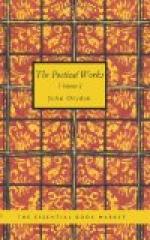Who mortifies his person all he can:
What we uncharitably take for sin,
Are only rules of this odd capuchin;
For never hermit under grave pretence,
Has lived more contrary to common sense;
And ’tis a miracle we may suppose, 220
No nastiness offends his skilful nose:
Which from all stink can with peculiar art
Extract perfume and essence from a f—t.
Expecting supper is his great delight;
He toils all day but to be drunk at night:
Then o’er his cups this night-bird chirping sits,
Till he takes Hewet and Jack Hall[63] for wits.
Rochester I despise for want
of wit,
Though thought to have a tail and cloven
feet;
For while he mischief means to all mankind,
230
Himself alone the ill effects does find:
And so like witches justly suffer shame,
Whose harmless malice is so much the same.
False are his words, affected is his wit;
So often he does aim, so seldom hit;
To every face he cringes while he speaks,
But when the back is turn’d, the
head he breaks:
Mean in each action, lewd in every limb,
Manners themselves are mischievous in
him:
A proof that chance alone makes every
creature, 240
A very Killigrew[64] without good nature.
For what a Bessus[65] has he always lived,
And his own kickings notably contrived!
For, there’s the folly that’s
still mix’d with fear,
Cowards more blows than any hero bear;
Of fighting sparks some may their pleasures
say,
But ’tis a bolder thing to run away:
The world may well forgive him all his
ill,
For every fault does prove his penance
still:
Falsely he falls into some dangerous noose,
250
And then as meanly labours to get loose;
A life so infamous is better quitting,
Spent in base injury and low submitting.
I’d like to have left out his poetry;
Forgot by all almost as well as me.
Sometimes he has some humour, never wit,
And if it rarely, very rarely, hit,
’Tis under so much nasty rubbish
laid,
To find it out’s the cinderwoman’s
trade;
Who for the wretched remnants of a fire,
260
Must toil all day in ashes and in mire.
So lewdly dull his idle works appear,
The wretched texts deserve no comments
here;
Where one poor thought sometimes, left
all alone,
For a whole page of dulness must atone.
How vain a thing is man, and how
unwise!
Even he, who would himself the most despise!
I, who so wise and humble seem to be,
Now my own vanity and pride can’t
see;
While the world’s nonsense is so
sharply shown, 270
We pull down others’ but to raise
our own;
That we may angels seem, we paint them




